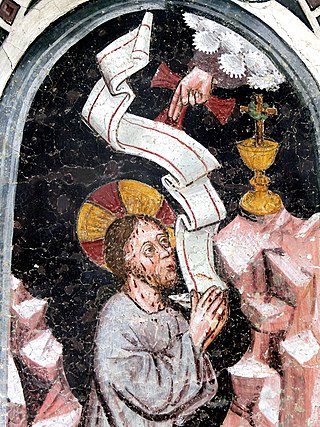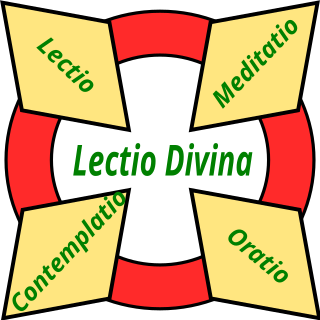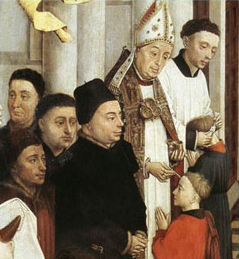Holy Spirit is an aspect of God in Abrahamic religions.
Contents
- Religion
- Religious orders
- Places of worship
- Schools
- Other religious institutions
- Other uses
- See also
Holy Spirit may refer to:
Holy Spirit is an aspect of God in Abrahamic religions.
Holy Spirit may refer to:
Holy Spirit may also refer to:
To be born again, or to experience the new birth, is a phrase, particularly in evangelicalism, that refers to a "spiritual rebirth", or a regeneration of the human spirit. In contrast to one's physical birth, being "born again" is distinctly and separately caused by the operation of the Holy Spirit, and it occurs when one surrenders their life to Christ. It is a core doctrine of the denominations of the Anabaptist, Moravian, Methodist, Baptist, Plymouth Brethren and Pentecostal Churches along with all other evangelical Christian denominations. All of these Churches strongly believe Jesus's words in the Gospels: "You must be born again before you can see, or enter, the Kingdom of Heaven". Their doctrines also mandate that to be both "born again" and "saved", one must have a personal and intimate relationship with Jesus Christ.
Speaking in tongues, also known as glossolalia, is an activity or practice in which people utter words or speech-like sounds, often thought by believers to be languages unknown to the speaker. One definition used by linguists is the fluid vocalizing of speech-like syllables that lack any readily comprehended meaning. In some cases, as part of religious practice, some believe it to be a divine language unknown to the speaker. Glossolalia is practiced in Pentecostal and charismatic Christianity, as well as in other religions.

In Judaism, the Holy Spirit, otherwise known as the Holy Ghost, is the divine force, quality and influence of God over the universe or his creatures. In Nicene Christianity, the Holy Spirit is the third person of the Trinity. In Islam, the Holy Spirit acts as an agent of divine action or communication. In the Baha’i Faith, the Holy Spirit is seen as the intermediary between God and man and "the outpouring grace of God and the effulgent rays that emanate from His Manifestation".

Pentecost is a Christian holiday which takes place on the 49th day after Easter Day. It commemorates the descent of the Holy Spirit upon the Apostles of Jesus while they were in Jerusalem celebrating the Feast of Weeks, as described in the Acts of the Apostles. The Catholic Church believes the Holy Spirit descended upon Mary, the mother of Jesus, at the same time, as recorded in the Acts of the Apostles.

A spiritual gift or charism is an extraordinary power given by the Holy Spirit. These are believed by followers to be supernatural graces that individual Christians need to fulfill the mission of the Church. In the narrowest sense, it is a theological term for the extraordinary graces given to individual Christians for the good of others and is distinguished from the graces given for personal sanctification, such as the Seven Gifts of the Holy Spirit and the fruit of the Holy Spirit.

Religious ecstasy is a type of altered state of consciousness characterized by greatly reduced external awareness and reportedly expanded interior mental and spiritual awareness, frequently accompanied by visions and emotional euphoria.

In Christian denominations that practice infant baptism, confirmation is seen as the sealing of the covenant created in baptism. Those being confirmed are known as confirmands. For adults, it is an affirmation of belief. The ceremony typically involves laying on of hands.

The epiclesis refers to the invocation of one or several gods. In ancient Greek religion, the epiclesis was the epithet used as the surname given to a deity in religious contexts. The term was borrowed into the Christian tradition, where it designates the part of the Anaphora by which the priest invokes the Holy Spirit upon the Eucharistic bread and wine in some Christian churches. In most Eastern Christian traditions, the Epiclesis comes after the Anamnesis ; in the Western Rite it usually precedes. In the historic practice of the Western Christian Churches, the consecration is effected at the Words of Institution though during the rise of the Liturgical Movement, many denominations introduced an explicit epiclesis in their liturgies.
The charismatic movement in Christianity is a movement within established or mainstream Christian denominations to adopt beliefs and practices of Charismatic Christianity, with an emphasis on baptism with the Holy Spirit, and the use of spiritual gifts (charismata). It has affected most denominations in the United States, and has spread widely across the world.

Whit Monday or Pentecost Monday, also known as Monday of the Holy Spirit, is the holiday celebrated the day after Pentecost, a moveable feast in the Christian liturgical calendar. It is moveable because it is determined by the date of Easter. In the Catholic Church, it is the Memorial of the Blessed Virgin Mary, Mother of the Church, marking the resumption of Ordinary Time.

Consecration is the transfer of a person or a thing to the sacred sphere for a special purpose or service. The word consecration literally means "association with the sacred". Persons, places, or things can be consecrated, and the term is used in various ways by different groups. The origin of the word comes from the Latin stem consecrat, which means dedicated, devoted, and sacred. A synonym for consecration is sanctification; its antonym is desecration.
The Church of the Holy Sepulchre is a church in the Christian Quarter of the Old City of Jerusalem, believed to be the site of Jesus Christ's empty tomb.

In Western Christianity, Lectio Divina is a traditional monastic practice of scriptural reading, meditation and prayer intended to promote communion with God and to increase the knowledge of God's word. In the view of one commentator, it does not treat Scripture as texts to be studied, but as the living word.
The rule of faith is the name given to the ultimate authority in Christian belief or fundamental hermeneutic (interpretive) standard. It was used by Early Christian writers such as Tertullian. The phrase is sometimes used for early creeds.

Confirmation in the Catholic Church is one of the seven sacraments. It is also one of the three sacraments of initiation into the Catholic Church, the other two being Baptism and Holy Communion.
Christian theology is the theology – the systematic study of the divine and religion – of Christianity and Christian belief and practice. It concentrates primarily upon the texts of the Old Testament and of the New Testament, as well as on Christian tradition. Christian theologians use biblical exegesis, rational analysis and argument. Theologians may undertake the study of Christian theology for a variety of reasons, such as in order to:

For the majority of Christian denominations, the Holy Spirit, or Holy Ghost, is believed to be the third Person of the Trinity, a triune God manifested as God the Father, God the Son, and God the Holy Spirit, each being God. Nontrinitarian Christians, who reject the doctrine of the Trinity, differ significantly from mainstream Christianity in their beliefs about the Holy Spirit. In Christian theology, pneumatology is the study of the Holy Spirit. Due to Christianity's historical relationship with Judaism, theologians often identify the Holy Spirit with the concept of the Ruach Hakodesh in Jewish scripture, on the theory that Jesus was expanding upon these Jewish concepts. Similar names, and ideas, include the Ruach Elohim, Ruach YHWH, and the Ruach Hakodesh. In the New Testament the Holy Spirit is identified with the Spirit of Christ, the Spirit of Truth, and the Paraclete (helper).
Holy Ghost is the third divine person of the Trinity in mainstream Christian theology. Nontrinitarian Christian theologies vary widely in how the Holy Ghost is defined.
The following outline is provided as an overview of and topical guide to the Catholic Church: